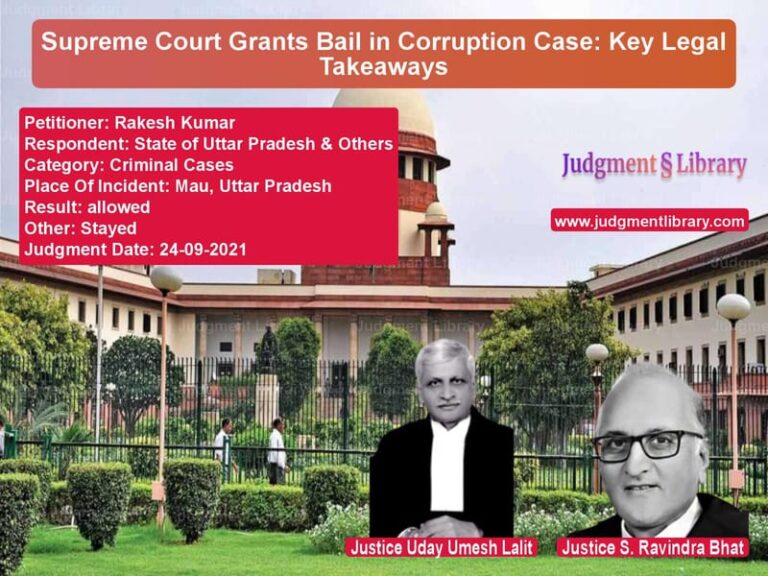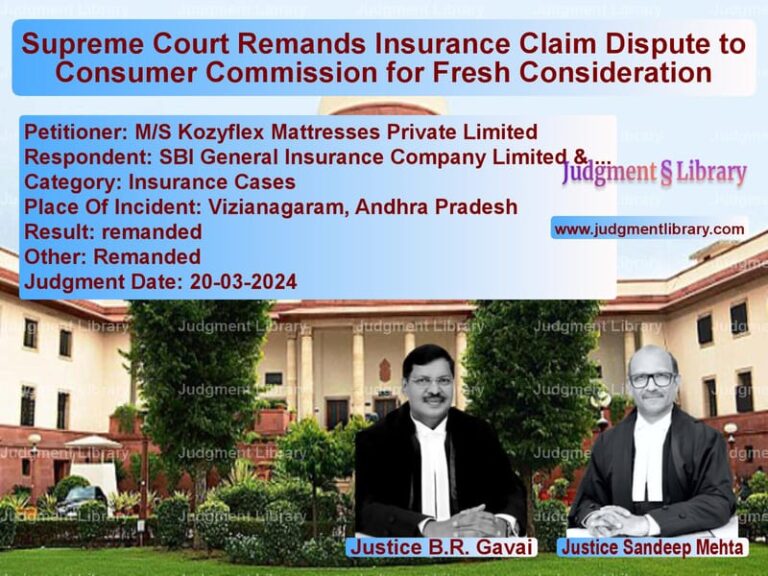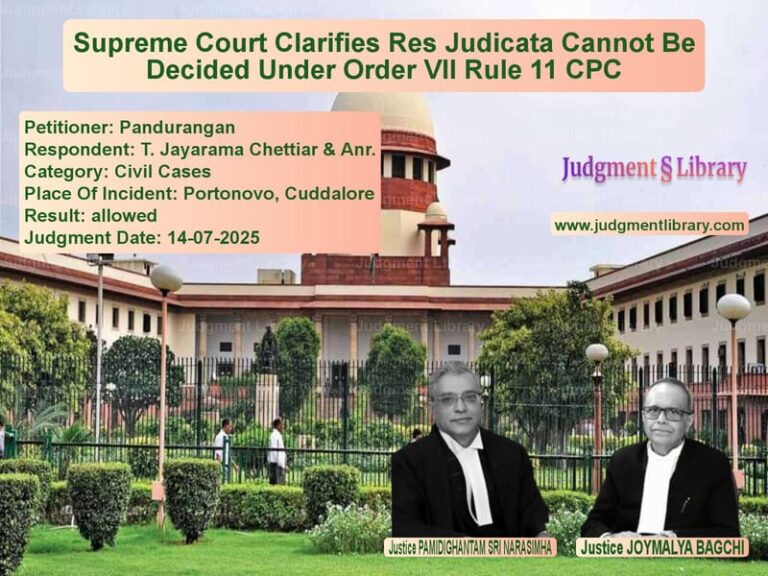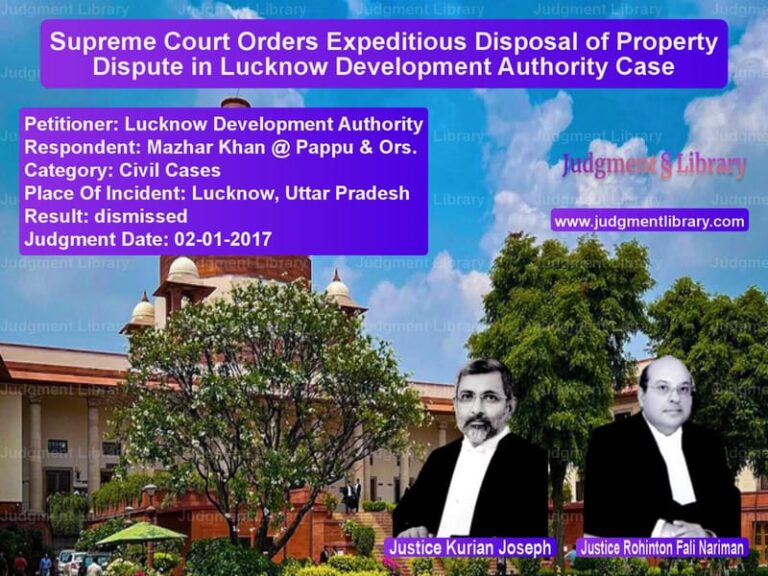Land Acquisition and Compensation: Supreme Court Overturns High Court Decision in Nashik Panchavati Panjarpol Trust Case
The Supreme Court of India recently delivered a crucial judgment in the case of Shri Nashik Panchavati Panjarpol Trust & Ors. vs. The Chairman & Anr.. The ruling, delivered by Bela M. Trivedi and Dipankar Datta, overturned the High Court’s decision and reinstated the Reference Court’s award, clarifying the issue of limitation in land acquisition disputes.
Land acquisition disputes have long been a contentious issue in India, especially when it comes to determining fair compensation. This case is particularly significant as it delves into the complexities of acquisition laws, contractual obligations, and the limitations prescribed under the Land Acquisition Act, 1894. The Supreme Court’s decision not only settles the dispute in favor of the appellant but also sets an important precedent regarding how consent terms should be interpreted in acquisition proceedings.
Background of the Case
The case originated from a dispute over the acquisition of land owned by the Shri Nashik Panchavati Panjarpol Trust. The lands in question, bearing Survey Nos. 74, 75, 76, and 29 in Makhamalabad, Nashik, were acquired by the Agricultural Produce Market Committee under Section 6 of the Land Acquisition Act, 1894, read with Section 126 of the Maharashtra Regional and Town Planning Act, 1966. The acquisition was meant for the establishment of an agricultural market, and compensation was awarded under Section 11 of the Act.
Chronology of Events
- June 17, 1993: The government issued a notification for the acquisition of land.
- January 12, 1996: The Land Acquisition Officer passed an award under Section 11 of the Land Acquisition Act.
- 1996: The appellant Trust filed Writ Petition No. 607 of 1996 in the Bombay High Court, challenging the award, citing delay.
- October 20, 1997: The parties reached a settlement, recorded by the High Court, which allowed the Trust to apply for enhanced compensation.
- December 3, 1997: The Trust submitted an application to the Collector for a reference under Section 18.
- March 7, 2006: The Reference Court ruled in favor of the Trust, granting additional compensation.
- 2006: The Market Committee challenged the award in the High Court, arguing the reference was time-barred.
- 2009: The High Court set aside the Reference Court’s award and remanded the matter.
- 2023: The Supreme Court overturned the High Court’s decision.
Petitioner’s Arguments
The Trust, represented by Senior Counsel B.H. Marlapalle, contended:
- The High Court erred in finding the reference application time-barred.
- The settlement recorded in the High Court in 1997 explicitly permitted the Trust to seek reference.
- The Market Committee’s objection to limitation was an attempt to evade additional compensation.
Respondent’s Arguments
The Market Committee, represented by Senior Counsel Parag Tripathi, argued:
- The Trust failed to file the reference application within four weeks of the High Court’s order, making it time-barred.
- The terms of the 1997 settlement did not override statutory limitations under Section 18.
- The Reference Court erred in ignoring the statutory bar.
Supreme Court’s Analysis
The Supreme Court examined the validity of the limitation argument raised by the Market Committee and held:
“The issue of limitation raised by the respondent was not only untenable but was highly unreasonable and improper.”
The Court emphasized the importance of the consent terms recorded in the High Court’s 1997 order, stating:
“The very purpose of arriving at the said consent terms was to do away with the hardship caused to both parties.”
Regarding the timeline for filing the reference application, the Court noted:
- The settlement did not specify a deadline for filing the application under Section 18.
- The Trust had applied within a reasonable time after receiving compensation and handing over possession.
- The Market Committee had acted with an ulterior motive in raising the limitation issue after taking possession.
Final Verdict
The Supreme Court ruled:
- The Trust’s reference application was valid and not time-barred.
- The Reference Court’s award granting additional compensation was restored.
- The High Court’s judgment setting aside the award was quashed.
- The Market Committee’s objections on limitation were rejected.
This ruling affirms that parties entering into settlements cannot later challenge agreed-upon procedures on technical grounds, ensuring fairness in land acquisition compensation.
Petitioner Name: Shri Nashik Panchavati Panjarpol Trust & Ors..Respondent Name: The Chairman & Anr..Judgment By: Justice Bela M. Trivedi, Justice Dipankar Datta.Place Of Incident: Nashik, Maharashtra.Judgment Date: 22-08-2023.
Don’t miss out on the full details! Download the complete judgment in PDF format below and gain valuable insights instantly!
Download Judgment: shri-nashik-panchava-vs-the-chairman-&-anr.-supreme-court-of-india-judgment-dated-22-08-2023.pdf
Directly Download Judgment: Directly download this Judgment
See all petitions in Property Disputes
See all petitions in Damages and Compensation
See all petitions in Judgment by Bela M. Trivedi
See all petitions in Judgment by Dipankar Datta
See all petitions in allowed
See all petitions in Quashed
See all petitions in supreme court of India judgments August 2023
See all petitions in 2023 judgments
See all posts in Civil Cases Category
See all allowed petitions in Civil Cases Category
See all Dismissed petitions in Civil Cases Category
See all partially allowed petitions in Civil Cases Category







